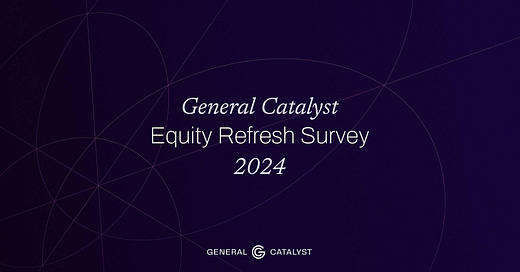What Data From General Catalyst's 2024 Equity Refresh Survey Reveals
Learn how equity grants are evolving in the tech industry to reward and retain employees.
Benchmarking data for startups and venture-backed companies is scarce, so I was excited to see this new open-source report from General Catalyst.
Shout out to Ripley Hartmeyer and Guissu Baier for the share. 🙌🏼
I reviewed General Catalyst’s 2024 Equity Refresh Survey (view/download) and am excited to share some key insights with subscribers.
This report dives into how venture-backed tech companies use equity compensation to retain top talent and align employee interests with long-term goals.
Let’s break it down.
Survey Demographics
First, let's set the stage with who participated in the survey:
76% of respondents are based in the United States.
The companies span various stages, with 24% at Series D+ and 21% at Series B, showing a good mix of mature and growing companies.
Industry-wise, 40% of respondents are from Enterprise & SaaS, followed by 20% in Healthtech & Life Sciences. This diversity provides a solid view across different sectors.
Key Findings
Calculation and Grant Size: The Balancing Act
One standout finding is how companies manage the size of their refresh grants:
66% of companies award refresh grants worth 25% or less of current new hire benchmarks. This cautious approach helps manage equity dilution while still providing meaningful incentives.
Most companies target the 50th percentile of market data for new hires. Early-stage companies focus on percentage ownership, while mature ones use notional dollar value. This strategic shift aligns with market conditions and company growth.
Eligibility and Distribution: Precision in Rewards
When it comes to who gets refresh equity, companies are quite selective:
Less than 25% of employees receive refresh equity grants at most companies. This ensures that the top performers are rewarded without excessive dilution.
59% of companies make employees eligible for subsequent refresh grants annually, creating a sustained performance incentive. This selective approach helps retain high performers and key talent, as 82% of companies reported that equity refresh programs are impactful in retaining top performers.
Criteria and Impact: Performance Over Tenure
Performance is the key driver here:
87% of companies prioritize individual performance when offering refresh equity. This means contributions that directly impact company success are highly valued.
A striking 82% reported that refresh grants significantly impact the retention of top performers. This underscores the effectiveness of equity grants in fostering long-term commitment.
Types of Refresh Grants: Tailored to Fit
Refresh grants come in three main types:
Performance Grant: Based solely on performance, rewarding exceptional achievements.
Tenure Grant: Issued at tenure milestones, recognizing long-term commitment.
Tenure & Performance Grant: A combination, providing a balanced approach.
71% of companies offer one type of refresh grant, keeping the reward structure simple.
29% combine multiple types, layering smaller tenure grants with larger performance grants, showing a nuanced approach to employee recognition.
Vesting Terms: Encouraging Longevity
Vesting terms are critical for retaining talent:
77% of refresh equity grants have four-year vesting periods, the most common length. This long-term horizon aligns employee interests with company growth.
47% of these grants begin vesting immediately, with no cliff, reflecting confidence in employee performance and a desire to minimize barriers to earning equity.
Promotion Grants: Aligning Career Advancement with Ownership
Promotion grants are also a key part of the equity picture:
83% of promotion grants have four-year vesting periods, consistent with new hire grants.
51% have no cliff, allowing immediate vesting, which can motivate employees to advance to new roles.
General Catalyst’s 2024 Equity Refresh Survey shows companies are getting smarter about equity compensation.
By carefully balancing grant size, eligibility criteria, and vesting terms, startups create programs that effectively reward performance, keep top talent, and align employee goals with the company's long-term success.





